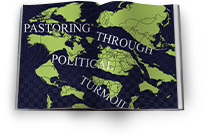Binding Consciences: Why We Do It, How We Do It, and Why It’s So Dangerous
There’s no subject that got the Apostle Paul’s dander up quite like Christian liberty.
The Epistle to the Galatians, which is largely dedicated to the topic, is full of exclamations like, “I am astonished that you are so quickly deserting him who called you in the grace of Christ and turning to a different gospel” (1:6) and “O foolish Galatians! Who has bewitched you?” This “bewitching” was the result of what Protestants have called “binding the conscience,” which threatened to subject the Galatian believers to a yoke of slavery.
CHRISTIAN LIBERTY DISTINCT FROM LIBERTY
For modern Americans, there are few subjects that get our dander up quite like what we call “liberty.” And for Christians, there’s a grave danger of confusing the two—Christian liberty and political liberty. But there’s in fact a very great distance between the two, a distance that the controversies over coronavirus have led many of us to lose sight of.
For some of us, we feel as through our liberty is being infringed upon anytime anyone tells us what to do. But for Paul, however, it was not actions that were the primary object of liberty, but consciences.
Consider the matter at stake in Galatians: circumcision. It wasn’t the act of circumcision itself that Paul was concerned about, but what the Judaizers taught about the meaning of the action—that is was a rite necessary to salvation, an act that obedience to God demanded. For Paul, and for the Protestant Reformers, Christian liberty was threatened not by being told what to do—after all, authority may often need to tell us to do many things we’d rather not—but by being told why we needed to do it: because God said so.
ADDING OR SUBSTRACTING TO GOD’S COMMANDS
Of course, there are many things on which God does say so, many actions that God has commanded or forbidden in Scripture. Christian liberty, however, is threatened when any human being presumes to add to or subtract from God’s commands—or, as Paul faced in Galatians, to continue to insist on commands of God that have now passed away in Christ.
Although the Roman Catholic Church explicitly claims the right to add spiritually binding commands beyond Scripture, Protestants tend toward subtler but no less dangerous violations of Christian liberty.
THE GAP BETWEEN PRINCIPLE AND APPLICATION
Quite often, we Protestants err not by manufacturing a wholly unbiblical demand out of nowhere, but by forgetting that there’s often a wide gap between our principles and applications. Scripture warns us against gluttony, but it doesn’t—in the New Testament at least—offer us a dietary code or a schedule for fasting. Scripture admonishes us to dress modestly, but it doesn’t give us tips on when it’s okay to wear skinny jeans. Scripture has something to say about the important differences between men and women, but not nearly as much as we might like it to.
Of course, I don’t mean to say we should never answer such practical questions: any parent seeking to disciple their child cannot merely rattle off the fruit of the Spirit, but must seek to help their son or daughter think about practical ways in which God calls them to cultivate that fruit in their own lives. Anyone in authority must try to form conclusions about what love of neighbor requires in a situation and issue laws or admonitions accordingly.
But here’s the problem: we’re tempted to fill in these gray areas, to leap across this gap between principle and application, sometimes even pretending the gap doesn’t exist. Rather than going through the hard work of moral reasoning and admitting just how many mistakes we might make in the process, we go straight from the principle to “The Bible says we must never do X” or “must always do Y” or “must do Z in this particular situation.” We remove moral uncertainty and ambiguous authority from the equation by making it a simple matter of “you’re either obeying Jesus, or you’re not.”
5 DANGERS OF WRONGLY BINDING CONSCIENCES
Whenever we do this, we risk wrongly binding consciences—naming something as clear sin that God’s law has left us free to deliberate and disagree about. This can cause impressionable believers to stumble by making them equate a particular action with obedience to God, when in fact there may be multiple ways of faithfully obeying God on that issue.
Why is this dangerous—so dangerous that Paul angrily confronted the Apostle Peter over it? There are at least five dangerous responses that can result from such conscience-binding when it’s not according to the Word:
- Those of tender conscience may fall into needless fear that they’re incurring God’s wrath because they’ve failed to behave in a certain way.
- Those who tend toward complacency may feel false assurance that they’re spiritually alright because they, in fact, have toed the line of the outward behavior being condemned.
- Those who are Pharisaical may be tempted to look askance at other Christians not following the command, and conclude, with smug satisfaction, that those “other believers” are less holy.
- Those who are rebellious may feel an urge to disobey the command, however good advice it is, just because it has been framed as an absolute command.
- Those who are wavering in their faith may see that the command is foolish or unreasonable, and since it is supposedly coming from Scripture, conclude that God must be a tyrant. Our culture today is full of men and women who left the church because they came to associate the faith with the arbitrary legalism or petty taboos of their church communities.
In all of these ways, attempts to bind the conscience outside of Scripture will tend to obscure the glorious gospel of justification and focus our attention on works of our own invention. And it’s important to note that you can do this not merely by requiring what Scripture doesn’t require, but also by forbidding what Scripture doesn’t forbid. A pastor who tells his people that God doesn’t want them wearing masks is violating Christian liberty; a pastor who admonishes compliance with government commands (which are directly only toward actions, and not consciences) need not be.
WHO CAN BIND A CONSCIENCE?
So we’ve seen what it means to bind the conscience and why it’s dangerous. So who’s at risk of doing this?
Some would say that only a pastor of a congregation, or someone in a position of formal authority over a certain group of people, can bind consciences, and even then only if they explicitly say, “The Lord commands this.”
But this seems to me naïve. Let’s start with the latter point. Human nature being what it is, it’s easy for someone of tender conscience to hear something as a spiritually binding demand when it comes from someone in a position of spiritual authority. The pastor who preaches against tattoos might protest that he is simply strongly advising against them, not saying that each and every tattoo is a sin, but he must be mindful of how his words will be heard.
Likewise, in our age of mass media, we should realize that a great deal of authority—especially among evangelicals—is wielded at an informal level by Christian leaders who might pastor a church of only 500 but have an online audience of 50,000. The pastor who uses his position of great influence to make people think that obedience to Christ strictly demands some behavior that Scripture doesn’t specify is in great danger of binding consciences—or at least unduly burdening them.
Indeed, one doesn’t need to be an ordained pastor at all. Martin Luther spoke of the priesthood of all believers, and each of us is indeed called upon to preach Christ and his Word to one another. If we do so badly—perhaps by adding demands beyond Scripture—then we too are at risk of being like the Galatian Judaizers, especially if God has gifted us with significant influence or persuasive powers.
THE TEMPTATION OF SHORTCUTS
In any time of great conflict and confusion, we naturally look for clues on how we should act, whom we should listen to, and what God wants us to do. We’re tempted in such situations to take shortcuts, to simplify the moral landscape before us, to grasp about for some relevant biblical principles, and to generate a formula for how all faithful Christians must respond.
We’re right to want to know what faithful discipleship requires of us. We must defend Christian liberty without falling into relativistic complacency. But when we hastily conflate all our conclusions with all of God’s commands, we endanger our own consciences and those of our brothers and sisters. “For freedom Christ has set us free; stand firm therefore, and do not submit again to a yoke of slavery” (Gal. 5:1).









